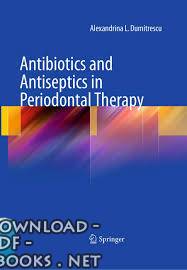📘 قراءة كتاب Antibiotics and Antiseptics in Periodontal Therapy أونلاين


التعويضات السنية Prosthodontics وتشمل
الجسور الثابتة Fixed bridges والزرعات Implants
الطقوم الكاملة المتحركة removable complete denture
الطقوم الجزئية المتحركة removable partial denture
معالجة و إصلاح الأسنان Operative Dentistry وتشمل:
تشخيص تسوس الأسنان caries diagnosis
الوقايه والحد من انتشار تسوس الاسنان management of dental caries
تبييض الأسنان Dentalbleaching
تجميل الأسنان cosmetic dentistry
حشوات الأسنان Dental Fillings
معالجة لب الأسنان Endodontics
معالجة الأسنان المجهرية microscopic endodontics
طب الأسنان الوقائي Preventive Dentistry
تقويم الأسنان Orthodontics
جراحة الفم والوجه والفكين Oral and Maxillofacial Surgery
طب أسنان الأطفال Pedodontics
أمراض اللثة
أمراض الأنسجة المحيطة بالأسنان Periodontics
زراعة الأسنان Dental Implantology
أشعة الأسنان Dental Radiology
طب الأسنان الشرعي Forensic Dentistry
طب الفم Oral Medicine
أمراض الفم Oral Pathology
أنسجة الفم والأسنان Oral Histology
المادة السنية Dental material
تشريح الأسنانDental anatomy
مواضيع متعلقة بطب الأسنان
طب الأسنان للرضع
جراحة الأسنان
أسنان
طقم أسنان
طب الاسنان في الاردن
طب الأسنان في جميع أنحاء العالم
Antibiotics and Antiseptics in Periodontal Therapy
by :Dr. Dumitrescu
1. Antibiotics and Antiseptics in Periodontal Therapy
2. Alexandrina L.Dumitrescu Antibiotics and Antiseptics in Periodontal Therapy
3. ISBN 978-3-642-13210-0 e-ISBN 978-3-642-13211-7 DOI 10.1007/978-3-642-13211-7 Springer Heidelberg Dordrecht London New York Library of Congress Control Number: 2010937957 © Springer-Verlag Berlin Heidelberg 2011 This work is subject to copyright. All rights are reserved, whether the whole or part of the material is concerned, specifically the rights of translation, reprinting, reuse of illustrations, recitation, broadcasting, reproduction on microfilm or in any other way, and storage in data banks. Duplication of this publication or parts thereof is permitted only under the provisions of the German Copyright Law of September 9, 1965, in its current version, and permission for use must always be obtained from Springer. Violations are liable to prosecution under the German Copyright Law. The use of general descriptive names, registered names, trademarks, etc. in this publication does not imply, even in the absence of a specific statement, that such names are exempt from the relevant protective laws and regulations and therefore free for general use. Product liability: The publishers cannot guarantee the accuracy of any information about dosage and appli- cation contained in this book. In every individual case the user must check such information by consulting the relevant literature. Cover design: eStudio Calamar, Figueres/Berlin Printed on acid-free paper Springer is part of Springer Science+Business Media (www.springer.com) Author Dr. Alexandrina L. Dumitrescu University of Tromsø Institute of Clinical Dentistry Department of Periodontology 9037 Tromsø Norway alexandrina.l.dumitrescu@gmail.com
4. v Preface Periodontitis is defined as an inflammatory disease of the periodontium characterized by inflammation of the gingival and adjacent attachment apparatus, illustrated by loss of clinical attachment due to destruction of the periodontal ligament and loss of the adjacent supporting bone. Periodontitis represents the major cause of tooth loss in adults leading to long-term disability and increased treatment needs. It is well estab- lished that the various periodontal diseases are caused by bacterial infection. Dental plaque was defined as “matrix-enclosed bacterial populations adherent to each other and/or to surfaces or interfaces”. Dental plaque is a microbial biofilm, a diverse microbial community found on the tooth surface embedded in a matrix of polymers of bacterial and salivary origin. This complex biofilm may offer some pro- tection from the host’s immunologic mechanisms as well as chemotherapeutic agents used for treatment. It is therefore logical to do first the mechanical removal and dis- ruption of the dental plaque biofilm itself. Antimicrobial agents are used extensively in both medicine and dentistry to elimi- nate infection. These drugs are also widely used as a prophylaxis to prevent infection in the “at risk” patient. This book is a collection of data from scientific papers and textbooks found to be important for the understanding of the antibiotics and antisep- tics used in the periodontal therapy. This book is addressed to dentists, periodontologists, undergraduate and postgrad- uate dental students, dental hygienists, and other co-associated professionals. Alexandrina L. Dumitrescu
5. vii Contents 1 Antimicrobial Resistance of Dental Plaque Biofilm ............................... 1 1.1 Characteristics of Dental Plaque as a Bacterial Biofilm........................ 1 1.1.1 Biofilm Formation .................................................................... 1 1.1.2 Architecture of Dental Plaque Biofilm..................................... 2 1.1.3 Microbial Composition of Dental Plaque................................. 3 1.1.4 Importance of Biofilms in Human Diseases............................. 7 1.2 Mechanisms of Biofilm Resistance Against Antimicrobials................. 8 1.2.1 Biofilm Impermeability to Antimicrobial Agents..................... 8 1.2.2 Altered Growth Rates in Biofilm Organisms............................ 9 1.2.3 The Biofilm Microenvironment Antagonizing Antimicrobial Activity.............................................................. 9 1.2.4 The Role of Horizontal Dissemination in the Biofilm.............. 9 1.2.5 Communications Systems (Quorum Sensing).......................... 13 1.2.6 Antibiotic Susceptibility of Bacterial Species Residing in Biofilms................................................................. 13 1.2.7 Role for Drug Delivery Systems for Combating Bacterial Resistance of Biofilm........................ 14 References...................................................................................................... 15 2 The Prophylactic Use of Antibiotics in Periodontal Therapy................. 19 2.1 Levels of Bacteremia Associated with Interventional Procedures and Everyday Activities...................................................... 20 2.1.1 Frequency of Bacteremia Associated with Dental Procedures and Oral Activities.............................. 20 2.1.2 Nature of Bacteremia Associated with Dental Procedures and Oral Activities...................................... 20 2.1.3 Magnitude of Bacteremia Associated with Dental Procedures and Oral Activities.............................. 20 2.1.4 Duration of Bacteremia Associated with Dental Procedures and Oral Activities.............................. 44 2.1.5 Impact of Dental Disease on Bacteremia.................................. 44 2.1.6 Impact of Oral Hygiene on Bacteremia.................................... 44 2.1.7 Impact of Type of Dental Procedure on Bacteremia................. 45 2.1.8 Impact of Antibiotic/Antiseptic Therapy on Bacteremia.......... 45 2.1.9 Cumulative Risk over Time of Bacteremias from Routine Daily Activities Compared with the Bacteremia from a Dental Procedure.......................... 45
6. viii Contents 2.2 Prophylaxis of Infective Endocarditis.................................................... 45 2.2.1 Pathogenesis of IE..................................................................... 46 2.2.2 Clinical Features of IE.............................................................. 46 2.2.3 Identification of At-Risk Patients for Occurrence or Mortality from Endocarditis........................ 46 2.2.4 Identification of At-Risk Dental Procedures............................. 46 2.2.5 Recommended Prophylactic Regimens for Dental Procedures............................................................... 50 2.2.6 Discussion................................................................................. 59 2.3 Antibiotic Prophylaxis before Invasive Dental Procedure in Patients with Joint Replacements..................................... 61 2.3.1 Existing Guidelines................................................................... 62 2.4 The Prevention of Infection Following Dental Surgical Procedures...... 69 2.4.1 The Asplenic Patient................................................................. 69 2.4.2 Transplantation Patients............................................................ 69 2.4.3 Hematological Patients............................................................. 70 2.4.4 HIV Infection............................................................................ 71 References...................................................................................................... 72 3 The Systemic Use of Antibiotics in Periodontal Therapy....................... 79 3.1 Advantages of Systemic Antibiotic Therapy in Periodontics................ 79 3.2 Disadvantages of Systemic Antibiotic Therapy in Periodontics......................................................................... 80 3.3 Efficacy of Systemic Antibiotic Therapy in Periodontics...................... 80 3.4 Microbiological Analysis....................................................................... 81 3.5 Drug Interactions.................................................................................... 82 3.6 Antibiotic Regimens in Periodontal Therapy......................................... 82 3.6.1 Single Antibiotic Regimes........................................................ 82 3.6.2 Combination Antimicrobial Therapy........................................ 117 3.6.3 Sequencing of Antibiotic Therapy............................................ 128 3.7 Adverse Effects...................................................................................... 129 3.8 Discussions of Available Data Regarding Effectiveness of Systemic Antibiotics in Periodontal Therapy.............. 134 3.8.1 Plaque Index Change................................................................ 134 3.8.2 Gingival Inflammation.............................................................. 134 3.8.3 PD and CAL Change................................................................ 135 3.8.4 Alveolar Bone Loss................................................................... 137 3.8.5 Gingival Crevicular Fluid Changes........................................... 137 3.9 Limitations of Available Data................................................................ 139 3.9.1 The Type of the Periodontal Disease........................................ 139 3.9.2 The Number of Subjects........................................................... 139 3.9.3 Characteristics of the Study Population.................................... 148 3.9.4 The Nature of the Clinical Measurements Performed in the Studies........................................................... 149 3.9.5 The Prescribed Antibiotics and Their Dosage and Duration of Administration................... 149 3.9.6 Characteristics of the Interventions.......................................... 150 3.9.7 The Study Design...................................................................... 151
7. Contents ix 3.10 What Dosage to Use?.......................................................................... 151 3.11 Considering Systemic Antibiotics as Monotherapy in the Treatment of Periodontal Disease?............................................ 151 3.12 Implications of Systemic Antibiotics as an Adjunct to Nonsurgical and Surgical Therapy.................................... 153 3.13 Recommendations for Treating Periodontitis with Antibiotics........... 154 3.14 Final Considerations............................................................................ 161 References...................................................................................................... 162 4 The Topical Use of Antibiotics in Periodontal Pockets............................ 171 4.1 Advantages and Disadvantages of Local Antimicrobial Agent Pocket Delivery.................................................... 171 4.2 Antibiotics for Topical Use in Periodontal Therapy.............................. 172 4.2.1 Tetracycline-HCl....................................................................... 172 4.2.2 Minocycline.............................................................................. 173 4.2.3 Doxycycline.............................................................................. 185 4.2.4 ................... 230
كتب طب اسنان
كتب طبية باللغة العربية pdf
كتب طب اسنان مترجمة
كتب تقويم اسنان بالعربي
كتب طب الاسنان في مصر
كتب طب اسنان بالعربي pdf
البسيط في تقويم الأسنان pdf
كتب طب اسنان سنة اولى
تحميل كتب في تقويم الاسنان
حجم الكتاب عند التحميل : 3.8 ميجا بايت .
نوع الكتاب : pdf.
عداد القراءة:
اذا اعجبك الكتاب فضلاً اضغط على أعجبني و يمكنك تحميله من هنا:

شكرًا لمساهمتكم
شكراً لمساهمتكم معنا في الإرتقاء بمستوى المكتبة ، يمكنكم االتبليغ عن اخطاء او سوء اختيار للكتب وتصنيفها ومحتواها ، أو كتاب يُمنع نشره ، او محمي بحقوق طبع ونشر ، فضلاً قم بالتبليغ عن الكتاب المُخالف:
 قبل تحميل الكتاب ..
قبل تحميل الكتاب ..
يجب ان يتوفر لديكم برنامج تشغيل وقراءة ملفات pdf
يمكن تحميلة من هنا 'http://get.adobe.com/reader/'


 منصّة المكتبة
منصّة المكتبة